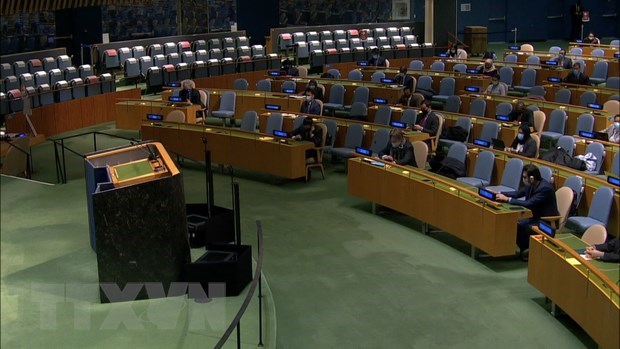as the international legal framework regulating all activities in the seas and oceans.
 |
|
Participants in the plenary meeting of the UN General Assembly’s 75th session on December 8 (Photo: VNA) |
At the event, held at the UN headquarters in New York, representatives of UN member states highlighted the universal, consistent, and comprehensive values of the 1982 UNCLOS while pointing out the COVID-19 pandemic’s impacts on the UN and agencies’ activities related to oceans and the law of the sea as well as on fundamental rights of seafarers.
They affirmed the commitment to promote negotiations on legally binding documents on biodiversity of areas beyond national jurisdiction and legal implications of the sea-level rise, and to boost the development of the marine economy and the conservation of marine resources so as to contribute to the realisation of the 2030 Agenda for Sustainable Development.
Particularly, the US, the UK, Germany, Japan, and Australia publicly mentioned disputes in the East Sea, voicing their concerns over legal claims in the waters.
They emphasised that the establishment of historic rights claims and historic claims on marine resources, the specification of straight archipelagic baselines, and the regime of islands must be in conformity with the UNCLOS.
They also underlined the need to ensure the freedom of navigation in the East Sea and the obligation to peacefully resolve international disputes in line with the UNCLOS.
Speaking at the meeting, Ambassador Dang Dinh Quy, head of Vietnam’s permanent mission to the UN, affirmed that Vietnam attaches importance to the convention’s universal, consistent, and comprehensive values.
The country appreciates contributions by the agencies set up under the UNCLOS to promoting a legal order for the seas and oceans, he said, noting that it also supports the UN General Assembly to create conditions for members of the Commission on the Limits of the Continental Shelf to work online with guaranteed security.
Vietnam also welcomes the second world ocean assessment report, which states that countries must perform all the obligations relevant to marine environment protection in accordance with the UNCLOS.
Regarding the East Sea situation, Quy reiterated Vietnam’s consistent stance that all disputes must be settled by peaceful means on the basis of international law, including the 1982 UNCLOS, with respect for diplomatic and legal processes and without using force or threatening to use force.
He expressed concern about some recent incidents in the East Sea which have seriously infringed Vietnam’s sovereign rights and jurisdiction.
The ambassador called on related parties to exercise self-restraint while not carrying out militarisation or conducting activities that complicate the situation, escalate disputes, affect the safety and security of navigation and overflight in the East Sea, or jeopardise peace and stability in the region.
All parties must fully implement the Declaration on the Conduct of Parties in the East Sea and soon finalise a substantive and efficient code of conduct that is in line with the UNCLOS, Quy added.
Concluding the meeting, the 75th session of the UN General Assembly adopted an annual resolution on sustainable fisheries. Meanwhile, a resolution on oceans and the law of the sea will be considered later.
30th meeting of state parties to 1982 UNCLOS wraps up
The plenary and closing session of the 30th meeting of state parties to the 1982 UN Convention on the Law of the Sea (UNCLOS) took place at the UN headquarters in New York on December 9 with the participation of nearly 120 member states.
At the session, Vietnam underlined the need for states to enhance international cooperation and have an overall and multi-sectoral approach to the settlement of challenges to the global marine environment.
Nearly 30 countries gave opinions on the UN Secretary-General’s report on oceans and law of the sea, highlighting challenges to the conservation and sustainable use of seas and oceans such as unsustainable economic activities, marine pollution, sea-level rise, and illegal, unreported, and unregulated fishing.
They stressed the necessity to step up international cooperation on the basis of the UNCLOS, boost member states’ convention implementation capacity, and promote the building of an international legally binding instrument on marine biodiversity in areas beyond national jurisdiction.
During the 30th meeting, Ambassador Dang Dinh Quy, head of the Vietnamese mission to the UN, affirmed the comprehensiveness, unity, and consistency of the 1982 UNCLOS, which is the framework regulating all sea- and ocean-related activities and helping to ensure safety, security, and freedom of navigation and implement the 2030 Agenda for Sustainable Development.
Regarding the East Sea situation, he reiterated Vietnam’s consistent stance, which was also affirmed at a plenary session of the UN General Assembly on December 8, that all disputes must be settled by peaceful means on the basis of international law, including the 1982 UNCLOS, with respect for diplomatic and legal processes and without using force or threatening to use force.
The diplomat expressed concern about some recent incidents in the East Sea that have seriously infringed Vietnam’s sovereign rights and jurisdiction.
Quy called on related parties to exercise self-restraint while not carrying out militarisation or conducting activities that complicate the situation, escalate disputes, affect the safety and security of navigation and overflight in the East Sea, or jeopardise peace and stability in the region.
All parties must fully implement the Declaration on the Conduct of Parties in the East Sea and soon finalise a substantive and efficient code of conduct that is in line with the UNCLOS, he added.
The 30th meeting of state parties to the 1982 UNCLOS kicked off on July 6. Due to movement restrictions imposed by New York authorities and the UN to prevent COVID-19 transmission, the event was held in different forms, including sending written opinions and feedback along with online and in-person sessions./.VNA